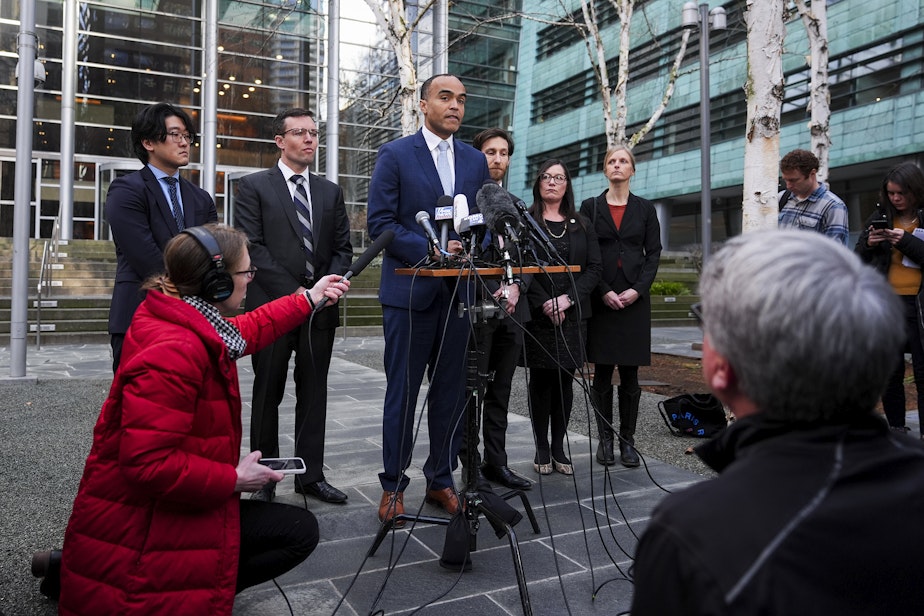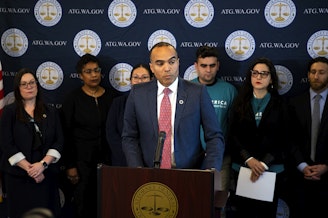Seattle judge temporarily blocks Trump executive order on birthright citizenship

Washington state Attorney General Nick Brown has claimed his first victory against President Donald Trump's administration — at least for now.
On Thursday, a federal judge in Seattle temporarily blocked an executive order from the president that sought to end birthright citizenship. Brown sued Trump and his administration to stop the order, calling the action "unconstitutional, un-American, and cruel."
RELATED: Washington state AG sues Trump administration over order to end birthright citizenship
Brown's office filed an emergency motion "to block any federal agency from relying on the order to deny citizenship to babies born in [Washington] state." U.S. District Judge John Coughenour granted that request, preventing the order from going into effect while the lawsuit plays out.
Coughenour flatly rejected Trump's order, calling it "blatantly unconstitutional."
"I've been on the bench for four decades, I can’t remember another case where the question presented is as clear as this one is," he said. "There are other times in world history where we look back and people of goodwill can say, 'Where were the judges? Where were the lawyers?'"
Speaking to reporters after the hearing, Brown said the judge's stern comments set "the tone for the seriousness of this effort." And that effort isn't over.
"This is step one," Brown conceded.
RELATED: WA Proud Boy Ethan Nordean has 18-year sentence commuted by Trump
The order isn't due to take effect until Feb. 19, and Brown's office will have to continue to build its case.
Justice Department attorney Brett Shumate, who was presenting for the Trump administration, argued against temporarily blocking the order, because its effective date isn't for another few weeks. Shumate tried to argue the matter wasn't urgent, giving the court time to conduct a more complete briefing before deciding to take any action. But Coughenour wasn't having it.
The judge quickly interrupted Shumate, asking if the attorney thought the order was constitutional. Shumate said he did, then tried to continue with his presentation.
Coughenour interrupted again.
"Frankly, I have difficulty understanding how a member of the bar could state that this is constitutional," he said.
It was a remarkable hearing, even frosty as Coughenour ended the proceeding. He informed the attorneys he'd signed the temporary restraining order, and left the room.
Read the temporary restraining order here:
Temporary Restraining Order.pdf
The ruling came just days after Trump signed the order, which he did on Monday, just hours after being sworn into office. He dubbed the order "Protecting the Meaning and Value of American Citizenship," which would do away with automatic birthright citizenship for children born in the U.S. to parents without legal status — a right protected by the 14th Amendment of the U.S. Constitution.
Washington state sued on Tuesday, joined by Oregon, Arizona, and Illinois.
RELATED: Project 2025 and Hanford: What Trump’s second term could mean for WA’s toxic sludge
The Attorney General's Office clarified the potential impact of Trump's order on Thursday. The state argues that, in 2022, about 7,000 children born in Washington state would have been affected by an order like this, because one or both parents lacked legal status. Under Trump's order, Brown said, children like them could be rendered "undocumented at birth."
"It could even render them the citizens of no country at all," he said after filing the lawsuit on Tuesday.
In their complaint filed in U.S. District Court for the Western District of Washington, the plaintiffs noted that the Citizenship Clause in the Fourteenth Amendment was passed and ratified in the wake of the Dred Scott decision in 1857 “where the Supreme Court ruled that Black Americans who were enslaved or were descended from enslaved persons could not be citizens.”
The complaint said the amendment clarified that “all individuals born in the United States and subject to its jurisdiction are citizens. Its operation is automatic.”
Speaking after the hearing, Brown said, “It was put into effect to reaffirm what it means to be an American. That’s why this case was so important and that’s why we had to act now.”
California and 17 other states also filed a federal lawsuit challenging Trump's executive order as of Tuesday morning, and the ACLU and immigration advocacy groups filed one Monday night.
Update notice, Thursday, 1/23/25 at 1 p.m.: This story has been updated to clarify that 7,000 Washingtonians were born to at least one parent without legal status in 2022, according to the state Attorney General's Office.




